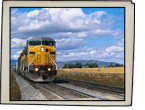 Rivers and railroad routes. Peter had tried since the beginning of his travels to lay a course across the country that would bring him in contact with those two means of transport. America's history was written along these dual roads of expansion and development, the pathways defined by commerce working its way west.
Rivers and railroad routes. Peter had tried since the beginning of his travels to lay a course across the country that would bring him in contact with those two means of transport. America's history was written along these dual roads of expansion and development, the pathways defined by commerce working its way west.
Out of New York to Bethlehem, birthplace of the steel industry, then down beside the Delaware into Quakertown and on over the swampy Perkioman to the Shuykill, where he picked up the Reading Railroad heading toward the pale shade and shattered granite spars of the Blue Mountains. Out across the sure, silvered breadth of the Susquehanna into the south.
Pulling across the top end of the Potomac, he fell into the shadowy forest canyons of the Cumberland Gap. Nothing stood between him and the Ohio now but the Monongahela, which, judging from its name, he expected to be hung with moss and strung with snakes and alligators along its banks.
The Ohio river. Here was a mighty road where nature defined the motion of progress. Tracing after its wander, he flowed with the Ohio until, as it laid a hard brown embrace on the heavily trafficked Wabash, he skipped from county road to fractured and ignored state highways. Shimmying along on tarmac remnants of energetic public enterprise, he ran first up and then back down the shallow sides of a hundred mile swale. This bald strip was the right of way, a corridor of dry country lying forever untended in a narrow aisle set aside for parallel steel ribbons laid head to tail on into Saint Louis.
From there, the Missouri ushered him toward Omaha—that fabled empty space at the heart of empty spaces. He drifted up to Springfield eventually, only to be floated out on another shimmering tax project across the Sand Hills grass sea toward the once bustling remnants of Alliance.
Lewis and Clark moved roughly along this track in their tortuous, oblique quest to disrobe the mysteries of the west. Peter employed their course only as an outline in making an effort to come to terms with the enormous grandeur of America in a fashion unique to himself.
Bozeman lapped up the Gallatin River, loving it to death, some said, while slaking a thirst which grew by the day. Culture had shifted here. Where stillness held the reins in Thermopolis, Bozeman practically wavered before the eye under the tremors of change. Saddle gentry from all parts of the world had taken an interest in the serene lifestyle of slippery transparent water and long grass meadows common to the Gallatin Range, and now relentlessly proffered up in countless Home and Garden, Lifestyle, and Sunset specials.
In keeping with his new custom, Peter wandered in search of strong cappuccino. One thing he’d found so far was that the further west he went, the more the coffee quality seemed to rise. Devotees of the bean appeared in forever greater numbers, justifying with their polyester athletic attire and sport vehicles a forever rising number of highgrade coffee outlets.
Pastry, biscotti, bagels, tea, coffee, juices, and numerous healthy blends of all the aforementioned were on offer. An ambrosia of smells thrown up by the mix sparked hunger and thirst the moment he entered the establishment. It was, Peter considered, the closest he ever hoped to come to being snared by a web whose silks were scent.
Another item signaling invasion was the presence of the New York Times. Copies were on sale along with the Wall Street Journal, Washington Post, Barrons, and the Atlantic Monthly. Never before had Bozeman’s citizenry felt any pressing need to know what went on in the world away from the valley. News of national import had until recently confined itself obligingly to three column sections of the local paper. Now the newcomers needed to know. The natives were puzzled. Why come here to keep your thoughts somewhere else?
Reading the intruder Times, sipping a thick and comforting brew while innocently indulging that intellectual compulsion to know. That was the moment. Peter would later see that in that instant he was set onto tracks that he could not depart until they reached their destination.